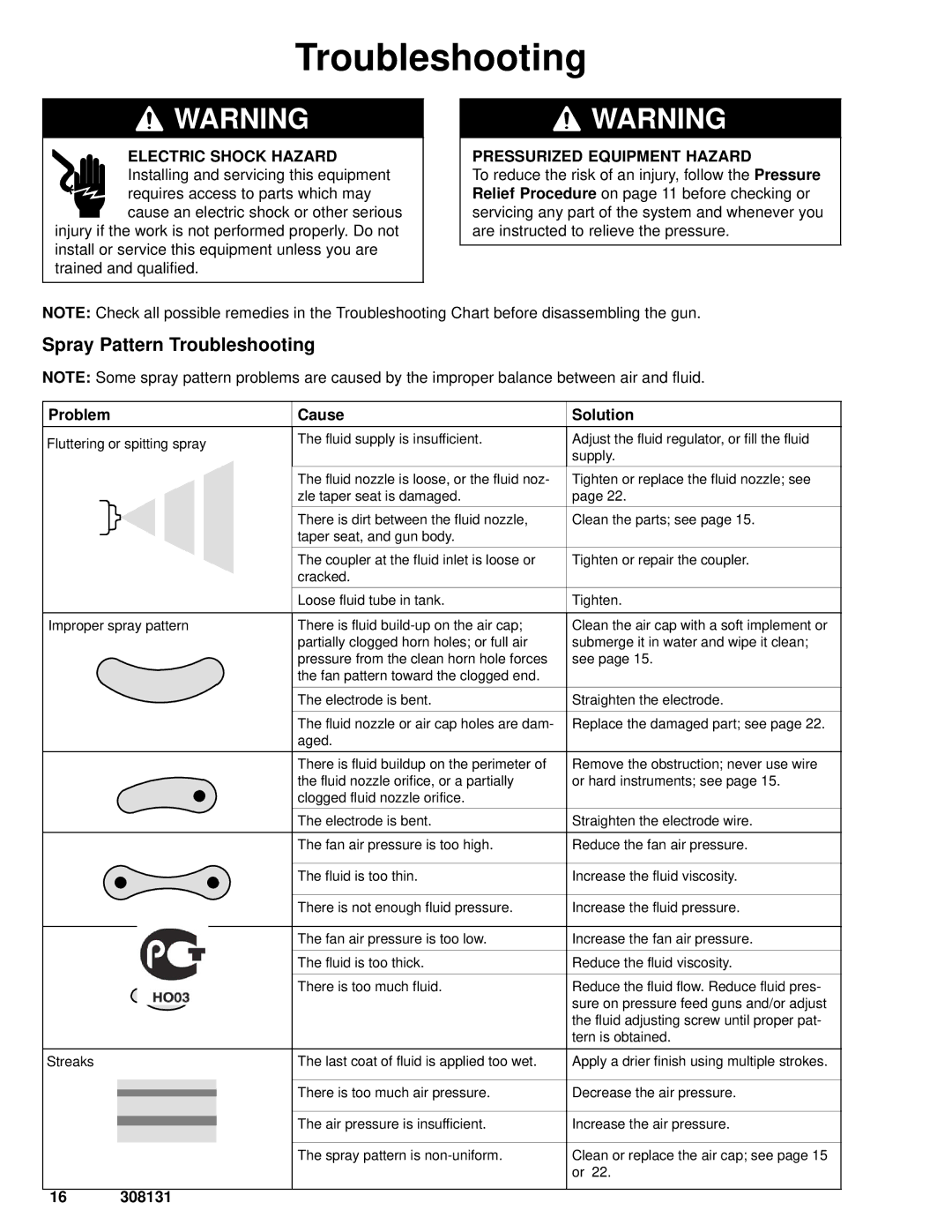
Troubleshooting
![]() WARNING
WARNING
ELECTRIC SHOCK HAZARD Installing and servicing this equipment requires access to parts which may cause an electric shock or other serious
injury if the work is not performed properly. Do not install or service this equipment unless you are trained and qualified.
![]() WARNING
WARNING
PRESSURIZED EQUIPMENT HAZARD
To reduce the risk of an injury, follow the Pressure Relief Procedure on page 11 before checking or servicing any part of the system and whenever you are instructed to relieve the pressure.
NOTE: Check all possible remedies in the Troubleshooting Chart before disassembling the gun.
Spray Pattern Troubleshooting
NOTE: Some spray pattern problems are caused by the improper balance between air and fluid.
Problem
Cause
Solution
Fluttering or spitting spray | The fluid supply is insufficient. | Adjust the fluid regulator, or fill the fluid | ||
| supply. | |||
|
|
|
| |
|
|
|
|
|
|
|
| The fluid nozzle is loose, or the fluid noz- | Tighten or replace the fluid nozzle; see |
|
|
| zle taper seat is damaged. | page 22. |
|
|
|
|
|
|
|
| There is dirt between the fluid nozzle, | Clean the parts; see page 15. |
|
|
| ||
|
|
| taper seat, and gun body. |
|
|
|
|
|
|
|
|
| The coupler at the fluid inlet is loose or | Tighten or repair the coupler. |
|
|
| cracked. |
|
|
|
|
|
|
|
|
| Loose fluid tube in tank. | Tighten. |
|
|
|
|
|
Improper spray pattern | There is fluid | Clean the air cap with a soft implement or | ||
|
|
| partially clogged horn holes; or full air | submerge it in water and wipe it clean; |
|
|
| pressure from the clean horn hole forces | see page 15. |
|
|
| the fan pattern toward the clogged end. |
|
|
|
|
|
|
|
|
| The electrode is bent. | Straighten the electrode. |
|
|
|
|
|
|
|
| The fluid nozzle or air cap holes are dam- | Replace the damaged part; see page 22. |
|
|
| aged. |
|
|
|
|
|
|
|
|
| There is fluid buildup on the perimeter of | Remove the obstruction; never use wire |
|
|
| the fluid nozzle orifice, or a partially | or hard instruments; see page 15. |
|
|
| clogged fluid nozzle orifice. |
|
|
|
|
|
|
|
|
| The electrode is bent. | Straighten the electrode wire. |
|
|
|
|
|
|
|
| The fan air pressure is too high. | Reduce the fan air pressure. |
|
|
|
|
|
|
|
| The fluid is too thin. | Increase the fluid viscosity. |
|
|
|
|
|
|
|
| There is not enough fluid pressure. | Increase the fluid pressure. |
|
|
|
|
|
|
|
| The fan air pressure is too low. | Increase the fan air pressure. |
|
|
|
|
|
|
|
| The fluid is too thick. | Reduce the fluid viscosity. |
|
|
|
|
|
|
|
| There is too much fluid. | Reduce the fluid flow. Reduce fluid pres- |
|
|
|
| sure on pressure feed guns and/or adjust |
|
|
|
| the fluid adjusting screw until proper pat- |
|
|
|
| tern is obtained. |
|
|
|
|
|
Streaks | The last coat of fluid is applied too wet. | Apply a drier finish using multiple strokes. | ||
|
|
|
|
|
|
|
| There is too much air pressure. | Decrease the air pressure. |
|
|
| ||
|
|
|
|
|
|
|
| The air pressure is insufficient. | Increase the air pressure. |
|
|
| ||
|
|
|
|
|
|
|
| The spray pattern is | Clean or replace the air cap; see page 15 |
|
|
|
| or 22. |
|
|
|
|
|
16 308131
